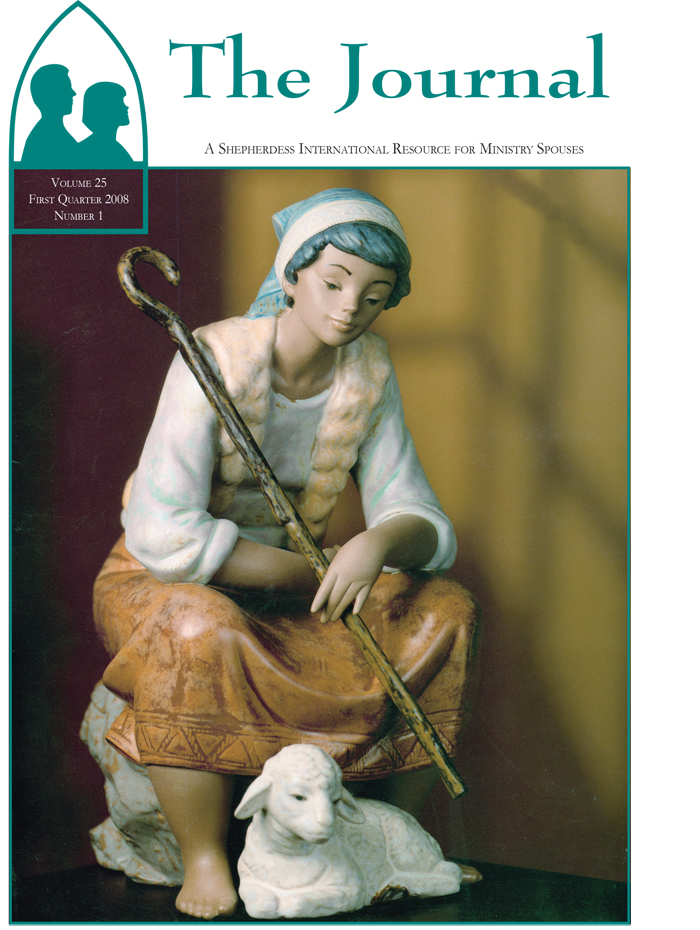Reflecting on my past experiences in ministry, I remember trying to find my niche, my role, and my gifts. An excerpt from my first book, There’s a Snake in My Garden, sums up the challenge—the best way to begin is to begin. Twenty-five years later, I’m still developing the gifts I’ve discovered and delighting in the gifts I didn’t know I had.
In my early days of ministry I noticed that at social gatherings, I was introduced as “the pastor’s wife.” Each time it happened, the snake snickered and pointed out that the other ladies present were not introduced as “the grocer’s wife” or “the road sweeper’s wife” or “the garbage collector’s spouse”!
“You’re stuck with it,” he hissed happily. “Every time you’re given your title, a preconceived notion flashes across their minds. All of them will have varied ideas of just how you ought to perform, and as each will differ according to their church and cultural backgrounds, you will have to be a freak to keep them all happy!”
It was true. I had had my own preconceived notions of a lady with such a title. I imagined a shadowy, mouse-like “personage living in the parsonage,” skulking about in the wings of a dilapidated creaky house—hair firmly screwed into a bun, flat shoes facilitating the many errands of mercy she must run. These “errands” were as vague in my mind as the personage herself! What was she so tirelessly and piously doing? Succoring the dying, mending other people’s cast-off clothes for the poor missionaries (only the best for God’s frontline workers!), pressing the parson’s Sunday suits all day Saturday, and helping with the annual sale of work to pay for a new church steeple to house more mice and bats?
“Help!” I gulped. “Please, Lord, not that!”
The snake was really enjoying himself now. He’d been working in his underground darkroom and had produced not only a set of pictures of the pastor’s wife at “home,” but also a set of pictures of the pastor’s wife at “work.” These he proceeded to share with me.
“You must please the church,” he intoned. “This is your first duty.” Of course, the snake doesn’t care who you please as long as you don’t bring pleasure to the heart of God. The church is an excellent substitute, especially if you are “religious” and wouldn’t be tempted to please “the world.” “They have a right to expect certain things of you,” he continued. “First of all, you must play the piano!” At this he nearly swallowed his horrid forked tongue in mirth!
“Well, that’s one way I’d be certain not to please the church,” I commented, “unless they want all their hymns played with one finger!”
Quite carried away, the snake continued. “A pastor’s wife must sit in the leadership chair at every women’s gathering. She must teach in the Sunday school (whether or not she has an impediment in her speech) and must never correct her children in public!”
I’d had enough. I decided the first funeral to be conducted by me, not my husband, would be a final ceremony when I would once and for all bury the image of “the pastor’s wife” under the life-giving soil of the Word of God.
What did God’s Word say about the matter? I turned to 1 Corinthians 12 and found that the apostle Paul didn’t want us to be ignorant about our spiritual gifts. I knew that the pastor’s wife had the same responsibility toward God as every other church member—to discover her spiritual gift and to exercise it. But I also knew there were certain “duties” that went along with her privileged position for which she might not be gifted.
I didn’t feel altogether ignorant as to my gifts. From past experience I knew that I had been blessed in starting things, dealing with explosive situations, and moving into new areas of evangelistic outreach. I knew I had gifts of teaching and speaking and a gift of creative ideas for children and teens. But I was not a gifted administrator or committee member; I was not a good listener; and I could produce little “small talk” in company. Seeing that the latter gifts seemed to be required for my pastoral duties, I had considerable trepidation in my heart.
“Maybe these gifts would develop as I exercised them,” I mused. Maybe I did possess them and just didn’t know it. I thought back to my early ministry days and the maxim God had taught me then: “The best way to begin is to begin.” So I decided to begin and see!
